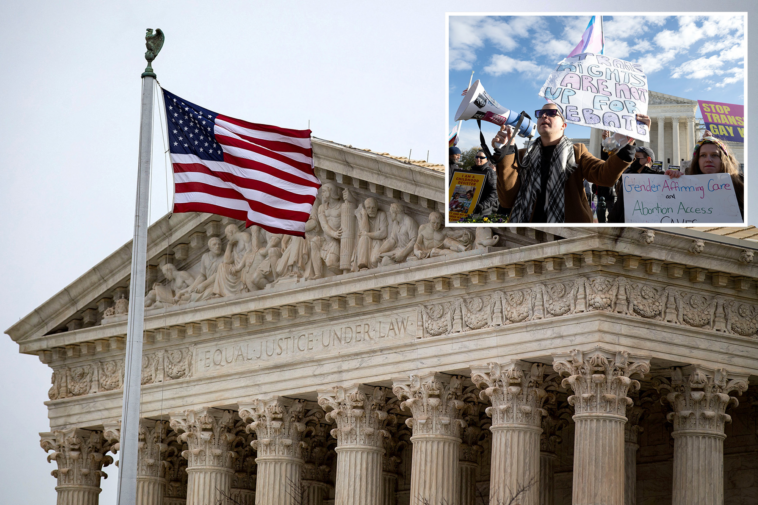The Supreme Court on Wednesday upheld Tennessee’s ban on transgender puberty blockers and hormone therapy treatments for minors in a 6-3 decision in a major win for more than half of US states that have similar laws on the books.
Chief Justice John Roberts authored the majority opinion backed by his five fellow conservative justices, which held that Tennessee’s law — and by extension 26 similar bills passed in other states — doesn’t violate the 14th Amendment’s Equal Protection Clause. The three liberal justices dissented.
“This case carries with it the weight of fierce scientific and policy debates about the safety, efficacy, and propriety of medical treatments in an evolving field,” Roberts acknowledged in the majority opinion.
“Our role … is only to ensure that it does not violate the equal protection guarantee of the Fourteenth Amendment,” he went on. “Having concluded it does not, we leave questions regarding its policy to the people, their elected representatives, and the democratic process.”
In 2023, Tennessee passed Senate Bill 1, to prohibit health care providers from administering procedures on minors “the purpose of enabling a minor to identify with, or live as, a purported identity inconsistent with the minor’s sex.” The law includes exemptions for children with congenital defects or chromosomal anomalies.
The Biden administration, three transgender minors, their parents, and a doctor promptly challenged the law, drawing mixed decisions in the lower courts, the most recent of which — the US Court of Appeals for the Sixth Circuit — backed Tennessee.
More than 1.6 million Americans ages 13 and older identify as transgender, according to data cited by the Supreme Court.
A district court had found that the plaintiffs lacked standing to challenge the ban on transgender surgeries for minors, which is why the Supreme Court focused on its implications for puberty blockers and hormone therapy treatments specifically. The law’s ban on surgeries for transgender minors was not before the high court.
Plaintiffs argued that the law is based on sex-based classifications and should therefore face heightened scrutiny — a rigorious standard — over whether it violates the Equal Protection Clause’s protections against sex discrimination.
Whether or not SB1 is subject to heightened scrutiny was the central question before the Supreme Court. The majority opinion found it does not because it is essentially relying on sex neutral classifications and therefore upheld the law.
“SB1 incorporates two classifications. First, SB1 classifies on the basis of age…Second, SB1 classifies on the basis of medical use,” Roberts noted in his opinion. “Neither of the above classifications turns on sex.”
“Rather, SB1 prohibits healthcare providers from administering puberty blockers and hormones to minors for certain medical uses, regardless of a minor’s sex,” he added. “This Court has never suggested that mere reference to sex is sufficient to trigger heightened scrutiny.”
Roberts also rejected concerns that the Tennessee law discriminated against individuals on the basis of their transgender status, concluding that the state merely removed one option from the “range of treatable conditions” for minors and that individuals over the age of 18 could still receive them.
Liberal Justice Sonia Sotomayor penned a scathing dissent and read it aloud from the bench on Wednesday to underscore her fierce objections.
“The majority subjects a law that plainly discriminates on the basis of sex to mere rational-basis review. By retreating from meaningful judicial review exactly where it matters most, the Court abandons transgender children and their families to political whims. In sadness, I dissent,” she wrote.
“When provided in appropriate cases, gender-affirming medical care can meaningfully improve the health and well-being of transgender adolescents, reducing anxiety, depression, suicidal ideation, and (for some patients) the need for more invasive surgical treatments later in life,” she added.
“Tennessee’s ban applies no matter what the minor’s parents and doctors think, with no regard for the severity of the minor’s mental health conditions or the extent to which treatment is medically necessary for an individual child.”
Her dissent was backed by fellow liberal Justices Ketanji Brown Jackson in whole and Elena Kagan in part. It took direct aim at Robert’s premise that SB1 targeted “medical purpose” and “age,” arguing that the flaw in his logic is that “SB1 prohibits is defined by reference to the patient’s sex.”
“SB1 does not just mention sex. It defines an entire category of prohibited conduct based on inconsistency with sex,” she continued. “And it is hard to imagine a law that prohibits conduct ‘inconsistent with’ sex that could avoid intermediate scrutiny.”
Kagan issued a separate dissent, noting that she agreed with Sotomayor that SB1 qualifies for heightened scrutiny but that she takes “no view on how SB1 would fare under heightened scrutiny.”
One key area that Robert’s majority opinion did not address is whether laws that make classifications on the basis of one’s status as transgender should face heightened scrutiny, the way that sex discrimination would.
Conservative Justice Amy Coney Barrett filed a concurring opinion joined by fellow conservative Justice Clarence Thomas, concluding that classifications in law on transgender status should not be subject to heightened scrutiny.
“Indeed, this Court ‘has not recognized any new constitutionally protected classes in over four decades, and instead has repeatedly declined to do so,’” she wrote. “For purposes of the Fourteenth Amendment, the relevant question is whether the group has been subject to a longstanding pattern of discrimination in the law. In other words, we ask whether the group has suffered a history of de jure discrimination. Existing suspect classes had such a history.”
“Beyond the treatment of gender dysphoria, transgender status implicates several other areas of legitimate regulatory policy—ranging from access to restrooms to eligibility for boys’ and girls’ sports teams,” she added. “If laws that classify based on transgender status necessarily trigger heightened scrutiny, then the courts will inevitably be in the business of ‘closely scrutiniz[ing] legislative choices’ in all these domains.”
Thomas and conservative Justice Samuel Alito also filed additional concurring opinions addressing other technical aspects of the case.
The case, United States v. Skrmetti, was one of the most high-profile issues on the Supreme Court’s docket this term, alongside President Trump’s challenge against birthright citizenship, a case that is really more about the extent of lower court powers to block presidential actions.



